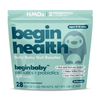Ingredients to Avoid in Baby Prebiotics and Probiotics
Ensuring Safe and Effective Gut Health for Your Little One
share this article

As parents, we strive to give our babies the best start in life, which includes promoting their gut health through prebiotics and probiotics. These supplements play a crucial role in supporting digestion, strengthening the immune system, and fostering overall well-being. However, not all prebiotics and probiotics are created equal. Some ingredients commonly found in these products may do more harm than good. In this blog, we’ll explore the key ingredients to avoid in baby prebiotics and probiotics, helping you make informed choices for your babies' health.
1. Artificial Additives and Preservatives
Artificial additives and preservatives are often included in supplements to enhance flavor, extend shelf life, or improve appearance. However, these ingredients can be harmful to babies, especially those with sensitive digestive systems. Common culprits include artificial sweeteners like aspartame, saccharin, and sucralose, as well as preservatives such as sodium benzoate and potassium sorbate. These substances can cause allergic reactions, disrupt gut flora, and lead to other health issues . Opt for products that are free from artificial additives and preservatives to ensure your baby receives only the purest and safest ingredients.
2. Maltodextrin
Maltodextrin is a common filler and thickening agent used in prebiotics and probiotics. While it is generally recognized as safe, maltodextrin has a high glycemic index, meaning it can cause spikes in blood sugar levels. This can be particularly concerning for infants who are more sensitive to fluctuations in blood sugar . Additionally, maltodextrin is often derived from genetically modified corn, raising concerns about potential GMO exposure. Look for products that use natural alternatives, such as organic rice flour or tapioca starch, which are gentler on the digestive system.
3. Soy and Dairy Derivatives
Many prebiotics and probiotics are derived from soy or dairy sources, which can pose problems for babies with allergies or intolerances. Soy, in particular, contains phytoestrogens that may interfere with hormonal development, while dairy can cause digestive discomfort in lactose-intolerant infants . Furthermore, soy and dairy are among the top allergens, and introducing them too early can increase the risk of developing food allergies. It’s important to choose hypoallergenic, soy-free, and dairy-free options to avoid these potential risks.
4. Synthetic Colors and Flavors
Synthetic colors and flavors are often added to make supplements more appealing, but they offer no nutritional benefits and can have adverse effects on your baby’s health. Studies have linked artificial colors to behavioral issues, such as hyperactivity, in children . Additionally, synthetic flavors can mask the true quality of the ingredients used, making it difficult for parents to assess the product’s safety and effectiveness. Always choose products that are free from artificial colors and flavors, and instead focus on those that use natural fruit extracts or essential oils for flavor.
5. Unregulated or Low-Quality Strains
Not all probiotic strains are created equal, and some may not be suitable for infants. It’s important to choose a product that contains well-researched, clinically tested strains, such as Bifidobacterium infantis and Lactobacillus reuteri, which are known to be safe and beneficial for babies . Additionally, be cautious of products that do not clearly label the strains used or the potency of the probiotics. Low-quality or unregulated strains may not provide the intended benefits and could even disrupt your baby’s gut flora. Look for products that are transparent about their ingredients and have undergone rigorous testing to ensure safety and efficacy.
Summary
When selecting baby prebiotics and probiotics, avoid ingredients like artificial additives, maltodextrin, soy, dairy derivatives, synthetic colors, and low-quality strains to ensure safe and effective gut health. Opt for high-quality, organic, and clinically tested options for the best support.



















